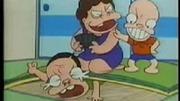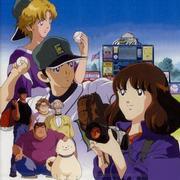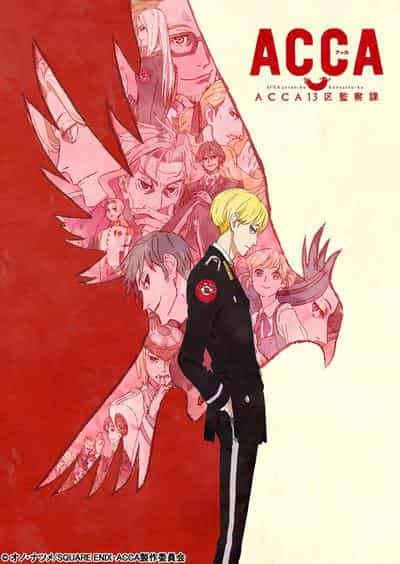The appeal and problems of Dame Oyaji: satire and empathy towards modern society

"Dame Oyaji": The appeal of this comedy anime that depicts the sorrows of Showa-era salarymen■Overview of the work"Dame Oyaji" is a TV anime series based on the manga of the same name by Mitsutoshi Furuya, which was broadcast on Tokyo 12 Channel from April 2nd to October 9th, 1974. It consists of 26 episodes, each 26 minutes long, and the broadcast time changed to Tuesdays, Fridays, and Wednesdays during the broadcast period. This work depicts in a humorous style the sorrow of the main character, Damesuke Ameno, who is treated as incompetent at work and is cruelly bullied by his wife and children at home. ■ StoryAmano Damesuke is treated as a useless employee at work, and at home he endures the relentless bullying from his wife and children. He works hard for his family, but he is abused and denied food every day, even though he earns too little. Damesuke's miserable life is one that gives viewers laughter and sympathy at the same time. ■Explanation"Dame Oyaji" is based on the original manga by Mitsutoshi Furuya, and depicts the sorrows of a Showa era salaryman in a humorous style. The protagonist, Damesuke, is treated as incompetent at work, and is bullied by his wife and children at home. This work became a hot topic because comedian and character actor Akira Oizumi plays the lead role and sings the theme song. Oizumi's unique voice and acting bring out the character of Damesuke even more. ■Cast
■ Main staff
■Theme songOP
ED
■ Main CharactersAmano DamesukeThe protagonist is an ordinary salaryman born in the Taisho era. He cannot look his wife Fuyuko in the eye because her parents paid off his past debts. He is a pathetic father who endures harsh bullying from his wife, daughter, and son, and continues to work like a horse for his family. Fuyuko AmanoShe is Damesuke's older wife and goes by the nickname Onibaba. Her hobby is to bully her unsuccessful husband Damesuke by letting out her daily frustrations and stress in hysterical outbursts. She has a sly and cunning personality. Yukiko AmanoA female college student and the eldest daughter of the Amano family. She is beautiful and has a great figure, but her personality is cold and cruel, just like Onibaba. Ameno Octopus BoyHe is the eldest son of the Ameno family and an elementary school student. Together with Onibaba and his sister, he takes out his daily frustrations on Damesuke, but sometimes he also shows concern for Damesuke. ■Subtitle
■ Evaluation and impressions"Dame Oyaji" was well received by many viewers as a comedy-style depiction of the sorrows of Showa-era office workers. In particular, the harsh treatment the main character, Damesuke, receives at work and at home has been praised for evoking laughter and sympathy in viewers at the same time. In addition, Oizumi Akira's unique voice and acting further enhanced Damesuke's character, leaving a strong impression on viewers. The work reflects the Showa period and satirizes the social and domestic problems of the time. In particular, the theme of bullying from wives and children symbolizes the domestic violence and domestic violence issues of the time, and encourages viewers to think deeply. In addition, the subtitles and stories of each episode are also very unique, and are designed to keep viewers interested. For example, in episodes such as "The Magic Mask" and "Uri Geller, the Bad Dad," Damesuke tries various ways to escape from his family's bullying, providing laughs to viewers. ■ Recommendation points"Dame Oyaji" is popular with many viewers as a comedy-style depiction of the sorrows of Showa-era office workers. In particular, the harsh treatment the main character, Damesuke, receives at work and at home has been praised for evoking laughter and sympathy in viewers at the same time. In addition, Oizumi Akira's unique voice and acting further enhance Damesuke's character, leaving a strong impression on viewers. The show reflects the Showa era and satirizes the social and domestic problems of the time. In particular, the theme of bullying from wives and children symbolizes the domestic violence and domestic violence issues of the time, and encourages viewers to think deeply. The subtitles and stories of each episode are also very unique, and are designed to keep viewers interested. For example, in episodes such as "The Magic Mask" and "Uri Geller, the Useless Dad," Damesuke is shown trying various ways to escape the bullying from his family, providing laughs to the viewers. "Dame Oyaji" is popular with many viewers as a comedy-style depiction of the sorrows of Showa-era office workers. In particular, the harsh treatment the protagonist Damesuke receives at work and at home has been praised for making viewers laugh and sympathize at the same time. In addition, Oizumi Akira's unique voice and acting further enhance Damesuke's character, leaving a strong impression on viewers. The work reflects the Showa era and satirizes the social and domestic problems of the time. In particular, the theme of bullying from wives and children symbolizes the domestic violence and domestic violence issues of the time, and encourages viewers to think deeply. In addition, the subtitles and stories of each episode are very unique, and are designed to keep viewers from getting bored. For example, Damesuke is depicted trying to escape the bullying from his family by various means, such as "The Magic Mask" and "Uri Geller of the Bad Father," providing laughter to viewers. |
>>: Fun Alarm Clock: The Appeal and Evaluation of Minna no Uta
Recommend
The DC blockbuster "Black Adam" has been confirmed to be released in North America at the end of 2021
Today (November 15), the DC blockbuster "Bla...
Detective Conan OVA #4 Review: Shinichi and Ran's Tanabata Memories and the Mystery of the Mahjong Tiles
Detective Conan: Shinichi and Ran, Mahjong tiles ...
TV Anime "Saiyuki RELOAD -ZEROIN-" Official Trailer
The official trailer of the TV animation "Sa...
"Mewtwo Strikes Back Evolution" is about to be released. Promotional art: Armored Mewtwo fights Rock Snake
The latest Pokémon theatrical movie animation fro...
"Love Apartment 5" new wedding photo poster Zeng Xiaoxian Yifei and others show their love
Christmas is coming. Today (December 25), "L...
Marvel Animated Series "What If..." Season 2 May Be Released Next Year
"What If..." is an experimental work of...
Deadpool, Wolverine and the director of "Deadpool 3" are expected to collaborate on a new film
"Deadpool" Ryan Reynolds recently told ...
Review of the movie "Hamtaro: Ham Ham Paradise": Exploring the mysterious demon picture book tower
"Hamtaro the Movie: Ham Ham Paradise: The My...
Chen Kexin's new film "Sauce Garden Lane" released concept poster
The concept poster of the movie "Jiangyuan L...
Brad Pitt's new film "Bullet Train" postponed to July summer release
The action thriller "Bullet Train" star...
Mission accomplished! A 9-minute sneak peek at the final chapter of the epic anime Space Battleship Yamato 2202
"Space Battleship Yamato", the masterpi...
The appeal and reviews of "Kuramerukagari": An anime experience not to be missed
Kuramerukagari - Movie reviews and details The fi...
Madam, please take the microphone away! Takahashi Rie's cover album of "Teasing Master Takagi-san" is released
The second season of "Teasing Master Takagi-...
The appeal and evaluation of Namisuke: A must-read review for anime fans
"Namisuke" - A short anime that depicts...
Tencent Video's "Celebrating Yu Nian 2" has exceeded 7 million reservations: the entire series has been completed
According to previous official introduction, the ...









